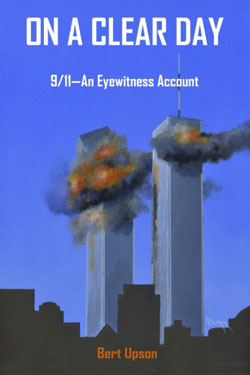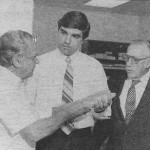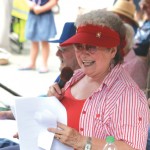
Photo courtesy Bert Upson
Bert Upson is a lucky man. He recounts how instinct and fortune saved him on multiple occasions on 9/11 in his book “On a Clear Day” (Thunderbird Press 2012).
He escaped the South Tower of the World Trade Center in the last express elevator to the ground floor minutes after the first plane hit the North Tower and before the second plane hit the South Tower. “I think about it every day,” he said. “My mission is to remind people that the threat of terrorism is still real. We can’t forget.”
Upson had flown from his home in Palm Desert, via San Francisco, to New York City on Sept. 10 to deliver a training seminar to clients whose office was on the 78th floor of the South Tower. That night he had dinner at Windows on the World, a celebrated restaurant that occupied floors 106 and 107 in the North Tower, One World Trade Center.

The next morning, Sept. 11, was a perfect fall day. “It was a beautiful, cloudless, sunny day,” he remembered. “Had the weather been bad, with fog or rain, things might have turned out quite differently.”
Upson walked the eight blocks from his hotel, the Club Quarters in lower Manhattan, to the World Trade Center. He took the South Tower express elevator to the 78th floor, the terminus of the express elevator. Upson recalled that people who worked in the tower immediately below or above floor 78 would routinely take the express to 78 then the local elevator or stairs to their floors, a fact that would prove critical after the South Tower was hit.
Upson walked into his clients’ 78th floor conference room around 8:40 for the seminar scheduled to begin at 9. He greeted his clients, most of whom he knew from previous trainings. Then, at 8:46, American Airlines Flight 11 crashed into the North Tower between floors 93 and 96. “There was a muffled explosion,” he recalled. “The building trembled quite a bit. I felt a change in air pressure and knew that something was very wrong. I looked outside. It had been a clear day but now it was gray with debris shooting horizontally past the windows at high speed.” Sizing up the situation Upson shouted, “We have to get out of here.”
It was now 8:49, three minutes after the first plane’s impact. One of his clients, Carol, began directing Upson back to the express elevator when an announcement came over the building’s public address system advising workers to stay in their offices — that the problem was not in the South Tower.
Upson, Carol and a growing group, nevertheless, headed for the elevator and were the last to get in, around 8:55. Descending at roughly a floor a second, they were out of the lobby and on the street by 8:59. “It was the last express from the 78th floor on that side of the building that made it to the lobby,” said Upson. “The elevator returned to the 78th floor but only made it back to the 36th before it shut down.”
At 9:03, United Airlines Flight 175 crashed into the south face of the South Tower between floors 77 and 85, directly into the floor Upson had only recently vacated. “We were on the street when the second plane hit,” he recalled. “We started running, hundreds of people pressed together and running.” He and Carol made it back to his hotel and were told to stay inside by security guards now posted on the street. “We were in the hotel when the South Tower collapsed at 9:59.” At 10:28, the North Tower collapsed.
Upson was lucky again while wandering later in the day in the dense dark of smoke and debris after the towers collapsed, trying to get to the East River. “Electricity was turned off in my hotel at 4:30 p.m.,” said Upson, noting the mayor had determined it was better concentrated to power rescue efforts. “I sensed something more was going to happen and wanted to get to water, to jump in if it became necessary,” he related. He was approached by three men who initially appeared friendly, but began moving in on him asking him for money. A SWAT team officer intervened to prevent Upson’s mugging by men the officer said were known gang members.
In one more serendipitous save, Upson caught the last subway north to mid-town Manhattan before the system shut down. He needed to find a hotel in uptown Manhattan since his was no longer operable and lower Manhattan was a disaster area.
Upson said he remembered going to bed that night believing he would not wake up the next morning, certain that the attacks were far from over.
Upson, a Yale grad who majored in the history of ideas, has spent the intervening years researching the roots and spread of terrorism, prior and post 9/11. He will tie it all together — where and how this kind of terrorism originates, and what we as a country can expect next — in his next book, working title “Terrorism 101.” “The original plan by Bin Laden was to hit 10 high-rise towers and three nuclear facilities to weaken American morale,” said Upson. “It may be unlikely that we’ll have another 9/11-like attack, but there will be more incidents.”
David McCullough, noted historian and multiple Pulitzer Prize-winning author, wrote this to Upson: “Bert, you do indeed have a story to tell and as a firsthand account of someone who was there in the midst of the horror of it all, what you’ve written, as is, has great historic value; of that there’s no question.”
For Upson’s in-person account of 9/11 and its immediate aftermath from his current book, plan to attend his talk and power point presentation at 6 p.m. Thursday, June 18, at Silver Pines Lodge. There is a wine and cheese reception at 5:30 prior to the Upson’s talk. Both are free to the public.










